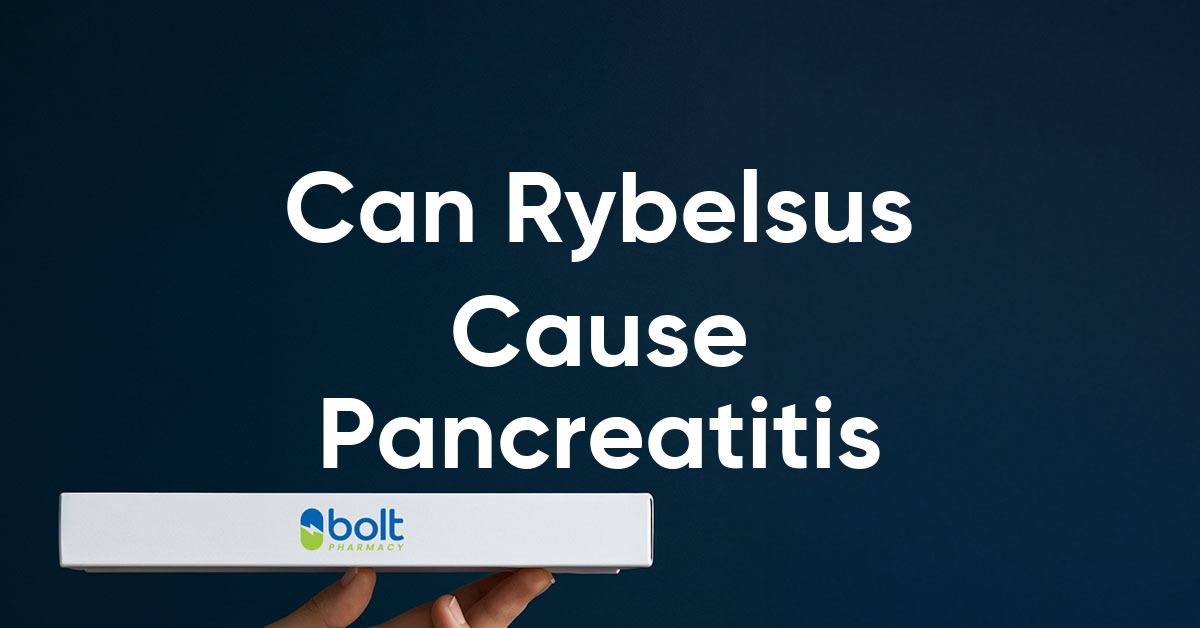Rybelsus (semaglutide) is an oral GLP-1 receptor agonist licensed in the UK for treating type 2 diabetes mellitus in adults. Whilst generally well-tolerated and effective at improving glycaemic control, concerns have emerged regarding a potential association with pancreatitis—a serious inflammatory condition of the pancreas. Understanding this risk is essential for patients and healthcare professionals to ensure safe prescribing and early recognition of warning symptoms. This article examines the evidence linking Rybelsus to pancreatitis, identifies key risk factors, and provides guidance on recognising symptoms and seeking urgent medical attention when necessary.
Summary: Rybelsus (semaglutide) has been associated with a low but recognised risk of pancreatitis, requiring immediate discontinuation and urgent medical assessment if symptoms develop.
- Rybelsus is an oral GLP-1 receptor agonist used to treat type 2 diabetes by stimulating insulin secretion and slowing gastric emptying.
- Pancreatitis presents with severe, persistent upper abdominal pain radiating to the back, often accompanied by nausea, vomiting, and fever.
- Patients with previous pancreatitis, gallstones, hypertriglyceridaemia, or excessive alcohol use face higher risk and require careful assessment before treatment.
- If pancreatitis is confirmed whilst taking Rybelsus, the medication must be permanently discontinued and not restarted.
- Suspected pancreatitis requires immediate cessation of Rybelsus and urgent medical evaluation including blood tests and imaging studies.
Table of Contents
What Is Rybelsus and How Does It Work?
Rybelsus (semaglutide) is an oral medication licensed in the UK for the treatment of type 2 diabetes mellitus in adults, as an adjunct to diet and exercise. It can be used as monotherapy when metformin is inappropriate or as an add-on to other diabetes medications. It belongs to a class of drugs known as glucagon-like peptide-1 (GLP-1) receptor agonists. Rybelsus is the first GLP-1 agonist available in tablet form, offering an alternative to injectable formulations such as Ozempic (also semaglutide) and other similar agents.
The mechanism of action centres on mimicking the naturally occurring hormone GLP-1, which is released by the gut in response to food intake. Semaglutide binds to GLP-1 receptors on pancreatic beta cells, stimulating insulin secretion in a glucose-dependent manner. This means insulin is released only when blood glucose levels are elevated, reducing the risk of hypoglycaemia. However, when Rybelsus is used in combination with insulin or sulfonylureas, the risk of hypoglycaemia increases and dose reductions of these medications may be needed. Additionally, Rybelsus suppresses glucagon secretion (a hormone that raises blood sugar), slows gastric emptying, and promotes satiety, which can lead to weight loss—a beneficial effect for many patients with type 2 diabetes.
Rybelsus is typically initiated at a low dose (3 mg once daily) for at least 30 days, then increased to 7 mg once daily. After at least another 30 days, the dose may be increased to 14 mg once daily if needed for better glycaemic control. It must be taken on an empty stomach with up to 120 mL of water only, and the tablet should be swallowed whole (not split, crushed or chewed). Wait at least 30 minutes before consuming any food, drink, or other oral medications to ensure adequate absorption.
While Rybelsus is generally well-tolerated and effective, like all medications, it carries potential risks. One area of concern that has emerged in clinical studies and post-marketing surveillance is the possible association with pancreatitis—a serious inflammatory condition of the pancreas. Understanding this risk is essential for both patients and healthcare professionals to ensure safe and informed use of the medication.

Recognising Symptoms of Pancreatitis While Taking Rybelsus
Pancreatitis is inflammation of the pancreas, which can present as either acute (sudden onset) or chronic (long-standing). Acute pancreatitis is a medical emergency requiring prompt evaluation and treatment. Recognising the symptoms early is crucial, particularly for patients taking medications like Rybelsus, where a potential—though not definitively proven—link has been observed.
The hallmark symptom of acute pancreatitis is severe, persistent abdominal pain, typically located in the upper abdomen and often radiating to the back. This pain may be described as sharp, stabbing, or constant, and it often worsens after eating. Patients may instinctively lean forward or curl up to find relief. Accompanying symptoms frequently include:
-
Nausea and vomiting that does not relieve the pain
-
Fever and general malaise
-
Abdominal tenderness and distension
-
Rapid pulse and signs of dehydration
-
In severe cases, jaundice (yellowing of the skin or eyes) may occur if the bile duct is affected
It is important to distinguish pancreatitis from the common gastrointestinal side effects of Rybelsus, such as nausea, vomiting, and abdominal discomfort, which are usually mild to moderate, transient, and improve with continued use or dose adjustment. Pancreatitis pain is characteristically severe, unrelenting, and does not improve with standard remedies like antacids or anti-nausea medication.
If you experience severe abdominal pain that does not resolve, especially if accompanied by persistent vomiting, fever, or signs of systemic illness, you should stop taking Rybelsus immediately and seek urgent medical attention. Call 999 if you have severe pain with collapse, signs of shock, confusion, or jaundice with severe pain. Otherwise, contact your GP urgently, call NHS 111, or attend your local A&E department. Do not wait to see if symptoms improve on their own. Early diagnosis through blood tests (measuring pancreatic enzymes such as lipase, which is more specific than amylase and typically elevated to at least 3 times the upper limit of normal in acute pancreatitis) and imaging (ultrasound or CT scan) is essential for appropriate management and to prevent complications such as pancreatic necrosis or systemic infection.
Risk Factors and Who Should Avoid Rybelsus
While the absolute risk of pancreatitis with Rybelsus remains low, certain patient groups may be at higher risk and require careful consideration before starting treatment. Understanding these risk factors helps clinicians and patients make informed decisions about the appropriateness of Rybelsus therapy.
Key risk factors for pancreatitis include:
-
Previous history of pancreatitis: The UK SmPC advises caution when using Rybelsus in patients with a history of pancreatitis. If pancreatitis occurs and is confirmed while on treatment, semaglutide should not be restarted.
-
Gallstones (cholelithiasis): Gallstones are a leading cause of acute pancreatitis. GLP-1 receptor agonists have been associated with gallbladder disorders including cholelithiasis and cholecystitis in clinical studies. Patients should be counselled about symptoms of biliary disease.
-
Hypertriglyceridaemia: Severely elevated triglyceride levels (typically >11.3 mmol/L) are an independent risk factor for pancreatitis. Patients with uncontrolled lipid disorders should have these addressed before considering Rybelsus.
-
Excessive alcohol consumption: Chronic alcohol use is a major cause of both acute and chronic pancreatitis and may compound any medication-related risk.
-
Hereditary pancreatitis: Rare genetic causes (such as PRSS1 mutations) may increase susceptibility to pancreatitis.
Contraindications as per the UK Summary of Product Characteristics (SmPC) include hypersensitivity to semaglutide or any of the excipients in Rybelsus.
Before prescribing Rybelsus, healthcare professionals should conduct a thorough medical history, assess pancreatic risk factors, and discuss the potential risks and benefits with the patient. Regular monitoring and patient education about warning symptoms are essential components of safe prescribing. Patients should be encouraged to disclose any history of pancreatic disease, gallstones, or significant alcohol use during consultations.
What to Do If You Suspect Pancreatitis on Rybelsus
If you develop symptoms suggestive of pancreatitis while taking Rybelsus, immediate action is required to ensure your safety and prevent serious complications. Pancreatitis can progress rapidly, and early intervention significantly improves outcomes.
Immediate steps to take:
- Stop taking Rybelsus immediately: Do not take another dose if you suspect pancreatitis. Continuing the medication may worsen the condition.
- Seek urgent medical attention: Call 999 if you have severe unrelenting pain with collapse, signs of shock, confusion, or jaundice with severe pain. Otherwise, contact your GP immediately, call NHS 111 for advice, or attend your local Accident & Emergency (A&E) department if symptoms are severe.
- Inform healthcare professionals: Make sure to tell the assessing doctor that you are taking Rybelsus and when you last took a dose. Bring your medication or a list of all current medications with you.
What to expect during assessment:
Your doctor will perform a clinical examination and likely order blood tests to measure pancreatic enzymes (lipase is more specific than amylase and typically elevated to at least 3 times the upper limit of normal in acute pancreatitis). Imaging studies such as an abdominal ultrasound or CT scan may be arranged to visualise the pancreas and identify inflammation, fluid collections, or other complications. Additional tests may assess liver function, triglyceride levels, and calcium levels to identify underlying causes.
Management and follow-up:
If pancreatitis is confirmed, Rybelsus will be permanently discontinued. Treatment for acute pancreatitis is primarily supportive, including intravenous fluids, pain relief, nutritional support, and monitoring for complications. Most cases resolve with conservative management, though severe cases may require intensive care.
After recovery, your diabetes management plan will need to be reviewed. Your GP or diabetes specialist will discuss alternative treatment options. Do not restart semaglutide if pancreatitis has been confirmed. Decisions about other GLP-1 receptor agonists should be made only with specialist advice, as there may be a class effect. Always report any suspected adverse drug reactions to the MHRA via the Yellow Card Scheme (yellowcard.mhra.gov.uk) to contribute to ongoing medication safety surveillance.
Frequently Asked Questions
What are the warning signs of pancreatitis whilst taking Rybelsus?
The hallmark symptom is severe, persistent upper abdominal pain radiating to the back, often accompanied by nausea, vomiting, fever, and abdominal tenderness. This pain is characteristically unrelenting and does not improve with standard remedies, distinguishing it from common gastrointestinal side effects of Rybelsus.
Should I stop taking Rybelsus if I suspect pancreatitis?
Yes, stop taking Rybelsus immediately and seek urgent medical attention if you develop symptoms suggestive of pancreatitis. Call 999 for severe symptoms with collapse or shock, or contact your GP urgently, call NHS 111, or attend A&E for prompt assessment.
Who is at higher risk of pancreatitis when taking Rybelsus?
Patients with a previous history of pancreatitis, gallstones, hypertriglyceridaemia, excessive alcohol consumption, or hereditary pancreatitis face increased risk. A thorough medical history and risk assessment should be conducted before starting Rybelsus therapy.
The health-related content published on this site is based on credible scientific sources and is periodically reviewed to ensure accuracy and relevance. Although we aim to reflect the most current medical knowledge, the material is meant for general education and awareness only.
The information on this site is not a substitute for professional medical advice. For any health concerns, please speak with a qualified medical professional. By using this information, you acknowledge responsibility for any decisions made and understand we are not liable for any consequences that may result.
Heading 1
Heading 2
Heading 3
Heading 4
Heading 5
Heading 6
Lorem ipsum dolor sit amet, consectetur adipiscing elit, sed do eiusmod tempor incididunt ut labore et dolore magna aliqua. Ut enim ad minim veniam, quis nostrud exercitation ullamco laboris nisi ut aliquip ex ea commodo consequat. Duis aute irure dolor in reprehenderit in voluptate velit esse cillum dolore eu fugiat nulla pariatur.
Block quote
Ordered list
- Item 1
- Item 2
- Item 3
Unordered list
- Item A
- Item B
- Item C
Bold text
Emphasis
Superscript
Subscript












